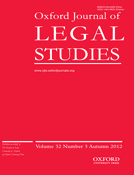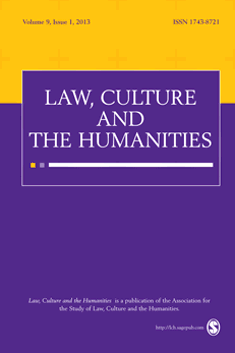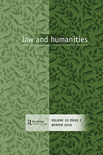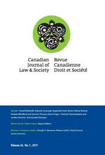
Law Text Culture
Scope & Guideline
Revealing the Complex Ties Between Law, Literature, and Society.
Introduction
Aims and Scopes
- Colonial and Post-Colonial Studies:
The journal emphasizes the exploration of colonial legacies and their ongoing impacts on contemporary legal systems, particularly focusing on Indigenous perspectives and rights. - Metaphor and Legal Discourse:
A significant aspect of the journal's focus is on the role of metaphor in legal language and discourse, analyzing how metaphors shape our understanding of law and justice. - Interdisciplinary Approaches:
Law Text Culture promotes interdisciplinary methodologies, integrating insights from literature, performance, and cultural studies to enrich legal scholarship. - Indigenous Law and Sovereignty:
The journal consistently addresses Indigenous legal traditions and sovereignty, advocating for the recognition of Indigenous perspectives within contemporary legal frameworks. - Theatrical Jurisprudence:
Exploring the intersection of law and performance, the journal examines how theatrical practices can inform and critique legal processes and narratives.
Trending and Emerging
- Decolonization and Legal Reform:
Recent publications have significantly emphasized decolonization efforts within legal frameworks, exploring how legal systems can be transformed to better serve Indigenous populations and address historical injustices. - Narrative and Law:
The use of narrative as a tool for understanding and critiquing law has become increasingly relevant, with scholars examining how storytelling shapes legal identities and experiences. - Violence and Law:
There is a growing interest in the intersections of law and violence, particularly regarding how legal systems perpetuate or mitigate violence against marginalized communities. - Environmental Law and Indigenous Rights:
Emerging themes around environmental justice and Indigenous rights are gaining traction, highlighting the legal implications of ecological crises and the role of Indigenous knowledge in environmental governance. - Cultural Metaphors in Law:
The exploration of cultural metaphors within legal discourse has become a vibrant area of inquiry, facilitating deeper understandings of how cultural narratives influence legal interpretations.
Declining or Waning
- Traditional Legal Theory:
There has been a noticeable decline in articles that engage with conventional legal theories or doctrines, potentially reflecting a broader move towards more critical and contextual approaches. - Historical Legal Analysis:
Papers centered on historical analyses of law without a contemporary lens appear to be diminishing, as the journal increasingly prioritizes current socio-political contexts. - Legal Formalism:
The focus on legal formalism, which emphasizes strict adherence to legal rules and procedures, seems to be waning in favor of more fluid and critical interpretations of law.
Similar Journals

Oxford Journal of Legal Studies
Pioneering Insights into Legal Theory and PracticeThe Oxford Journal of Legal Studies, published by Oxford University Press, stands as a prestigious platform for scholarly discourse within the field of law. Renowned for its impactful contributions to legal scholarship since its inception in 1981, this journal has established itself in the top tier of its category, currently classified as Q1 in Law based on the 2023 category quartiles. With its ISSN 0143-6503 and E-ISSN 1464-3820, the journal provides a comprehensive exploration of contemporary legal issues, theoretical perspectives, and empirical research, attracting contributions from leading academics and practitioners alike. Residing within the Social Sciences arena, it holds an impressive rank of 194/1025, landing it in the 81st percentile according to Scopus rankings. Though not currently an open-access publication, the Oxford Journal of Legal Studies remains vital for researchers, professionals, and students eager to deepen their understanding of legal frameworks and contemporary challenges within the legal landscape. Located in the heart of the United Kingdom, at Great Clarendon St, Oxford OX2 6DP, England, the journal is an indispensable resource for those advancing the study and practice of law.

OSGOODE HALL LAW JOURNAL
Leading the Way in Canadian Legal ResearchOsgoode Hall Law Journal, published by the renowned York University Osgoode Hall Law School, serves as a vital platform for legal scholarship in Canada. With a commitment to advancing knowledge in various fields of law, this journal publishes a broad range of articles, case studies, and critical analyses that address contemporary legal issues. While specific impact factors and indexing metrics such as H-Index and Scopus Ranks are not available, the journal's long-standing reputation and contributions to legal education make it an essential resource for researchers, legal practitioners, and students alike. Although it does not offer Open Access options, readers can access its content through libraries and subscriptions, ensuring the dissemination of high-quality legal research. The journal's aim is to foster robust dialogue among legal scholars and practitioners, thereby shaping the future of legal discourse in Canada and beyond.

JOURNAL OF THE HISTORY OF INTERNATIONAL LAW
Exploring the Evolution of International Legal FrameworksJOURNAL OF THE HISTORY OF INTERNATIONAL LAW, published by BRILL, stands as a pivotal contribution to the field of international legal history, advancing scholarly discourse since its inception. With an ISSN of 1388-199X and an E-ISSN of 1571-8050, this esteemed journal is based in Leiden, Netherlands, and features work that spans from 2007 to 2024. As evidenced by its performance in academic rankings, the journal occupies prestigious Q1 and Q2 quartiles in History and Law, respectively, indicating its significant impact and influence on these fields. Researchers will find rich insights drawn from a wide array of interdisciplinary approaches, enhancing understanding of historical contexts and contemporary implications in international law. Although the journal does not currently offer open access, its comprehensive analyses and critical reviews make it an essential resource for scholars, practitioners, and students dedicated to unraveling the complexities of international legal frameworks. Positioned within the 81st percentile in History and 39th in Political Science and International Relations, JOURNAL OF THE HISTORY OF INTERNATIONAL LAW is essential reading for anyone interested in the evolution of international legal systems and their historical underpinnings.

Australian Feminist Law Journal
Illuminating the path of feminist jurisprudence and social justice.Australian Feminist Law Journal, published by Routledge Journals, Taylor & Francis Ltd, stands out as a pivotal platform in the exploration of feminist legal scholarship and its intersection with gender, literature, and social sciences. With its ISSN 1320-0968 and E-ISSN 2204-0064, this journal has been contributing to critical discourses in feminist jurisprudence since its converged years begin in 2018, with ongoing contributions informing debates up to 2024. The journal holds notable standings within its categories, achieving Q3 in both Gender Studies and Law, and impressive Q1 in Literature and Literary Theory, underscoring its diverse scholarly impact. Researchers and practitioners can engage with this essential resource, which underscores the importance of feminist perspectives across various disciplines, fostering interdisciplinary dialogue and inspiring new research trajectories within an Australian and global context. Though currently not an open-access journal, the Australian Feminist Law Journal remains an invaluable resource for those committed to advancing feminist legal principles and advocating for social justice.

Materiali per una Storia della Cultura Giuridica
Decoding the Cultural Threads in Legal SystemsMateriali per una Storia della Cultura Giuridica is a prominent academic journal that delves into the historical and cultural facets of legal systems and practices. Published by SOC ED IL MULINO in Italy, this journal stands as a critical resource for scholars in the field of law as well as sociology and political science. With an ISSN of 1120-9607, it is dedicated to fostering a deeper understanding of legal culture through robust research and scholarly discourse. Though categorized in Q4 for both Law and Sociology and Political Science as of 2023, the journal serves as an essential platform for emerging voices and innovative perspectives in its converge years from 2015 to 2024. While currently lacking open access options, it is invaluable for researchers striving to explore the intricate relationships between culture and law. With its insightful articles and comprehensive analyses, Materiali per una Storia della Cultura Giuridica plays a significant role in the academic landscape, making it a must-read for students, professionals, and researchers alike on their quest for knowledge in legal history and cultural studies.

Law Culture and the Humanities
Unpacking the Cultural Dimensions of Legal FrameworksLaw Culture and the Humanities, published by SAGE Publications Ltd, serves as a pivotal forum for interdisciplinary dialogue at the intersection of law and the humanities. With an ISSN of 1743-8721 and an E-ISSN of 1743-9752, this esteemed journal has been contributing to scholarly discourse since its inception in 2005 and continues to do so until 2024. The journal carries a respectable impact factor showcased through its category rankings: Q3 in Arts and Humanities (miscellaneous), Q2 in Cultural Studies, and Q3 in Law. Its Scopus rankings reflect an impressive standing in the social sciences, particularly within Cultural Studies and Law, indicating that it is a fundamental resource for researchers and professionals aiming to explore the nuanced relationships between legal frameworks and cultural expressions. While not an Open Access journal, it offers substantial insights into contemporary debates, making it essential for academics and students engaged in the study of law's cultural dimensions.

Law and Humanities
Exploring the Nexus of Law and CultureLaw and Humanities, published by Routledge Journals, Taylor & Francis Ltd, serves as a pivotal platform at the intersection of legal studies and humanities, exploring the intricate relationships between law, culture, philosophy, and history. With an ISSN of 1752-1483 and an E-ISSN of 1752-1491, this esteemed journal has established its reputation within the academic community, achieving a Q2 ranking in the Arts and Humanities (miscellaneous) and a Q3 ranking in Law by 2023 metrics. It provides valuable insights and fosters critical dialogue among researchers, practitioners, and students, creating a comprehensive understanding of legal frameworks through a humanities lens. Although not currently open access, the journal's rigorous selection process ensures that published papers contribute significantly to the field, making it an essential resource for anyone interested in the dynamic interplay of law and human experience. Located in the United Kingdom, it continues to shape scholarly discourse from 2007 through its converged years, from 2014 to 2024, as it addresses the evolving challenges and inquiries that define contemporary legal thought.

Canadian Journal of Law and Society
Contributing to the Dialogue on Law and Social ChangeThe Canadian Journal of Law and Society, published by Cambridge University Press, is a distinguished academic journal dedicated to the multidisciplinary exploration of legal systems, social dynamics, and the intricate relationships that shape law and society. With an ISSN of 0829-3201 and an E-ISSN of 1911-0227, this journal has made significant contributions to the fields of Law, Sociology, and Political Science since its inception in 1986. Recognized in the 2023 category quartiles as Q3 in both Law and Sociology and Political Science, it stands as a credible platform for critical research, theoretical discussions, and empirical studies. Although not an open-access journal, it provides valuable insights that foster academic discourse and enhance understanding within the legal and social sciences domains. Addressed from the Edinburgh Building, Shaftesbury Road, Cambridge, England, the journal serves as an essential resource for researchers, practitioners, and students seeking to navigate the complexities of law and its societal impacts.

Derecho y Ciencias Sociales
Cultivating Critical Perspectives on Contemporary IssuesDerecho y Ciencias Sociales is a leading academic journal published by the National University of La Plata under the auspices of the Faculty of Humanities and Social Sciences. With ISSN 1853-0982 and E-ISSN 1852-2971, this journal specializes in the interdisciplinary exploration of legal frameworks, social structures, and cultural studies, making it an essential resource for researchers, professionals, and students in the fields of law and social sciences. Though currently not an open access journal, it provides a critical platform for rigorous scholarly dialogue, contributing to the advancement of knowledge and practice within its disciplines. The journal aims to engage with contemporary issues and methodologies, fostering an environment that promotes intellectual exchange and the development of innovative solutions to societal challenges. Published in La Plata, Buenos Aires, Derecho y Ciencias Sociales stands out for its commitment to academic excellence and its role in shaping the discourse in the interconnected realms of law and social sciences.

University of Western Australia Law Review
Connecting Scholars and Practitioners in Legal ResearchThe University of Western Australia Law Review is a prestigious academic journal dedicated to the critical examination and exploration of legal issues in Australia and beyond. Published by the Law School of the University of Western Australia, this journal has become a significant resource for legal scholars, practitioners, and students alike, contributing to the rich discourse in the field of law. With an ISSN of 0042-0328 and a current categorization in the Q3 quartile in the field of Law as per the 2023 rankings, it stands among a cohort of respected legal publications. The journal, though not open access, facilitates a sharing of unique insights and research from 2019 to 2024, aiming to address emerging and traditional legal challenges within a global context. With a Scopus rank of #651 out of 1025 in Social Sciences Law, it holds a percentile of 36, reflecting its valuable contributions to legal scholarship. The University of Western Australia Law Review invites researchers, practitioners, and students to engage with its rich content and to contribute to the ongoing dialogue shaping the future of law.